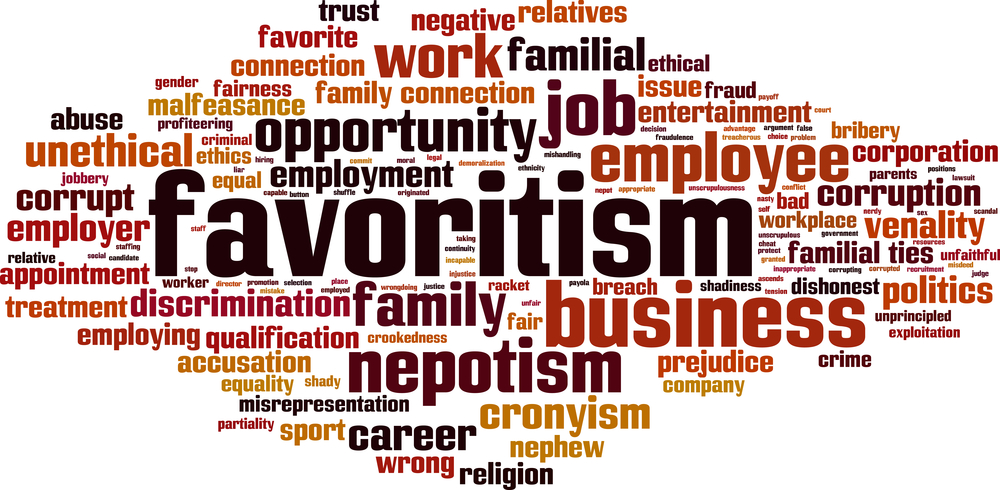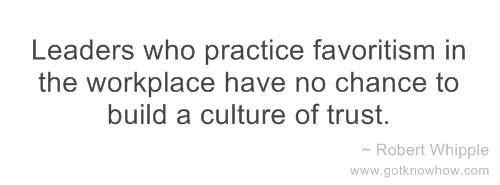 Some of my readers may know that I have one child. This makes it OK for me to call him my favourite son. However, in many families, schools, and workplaces, it’s just not right to call somebody your favourite when there’s more than one person in a particular role.
Some of my readers may know that I have one child. This makes it OK for me to call him my favourite son. However, in many families, schools, and workplaces, it’s just not right to call somebody your favourite when there’s more than one person in a particular role.
Favouritism is sometimes the worst kept secret, one that’s usually discussed quietly through discreet whispers and frustrated sighs. But the prevalence of people being preferred over others has existed long enough for us to have coined terms such as ‘the golden child’ and ‘the teacher’s pet’ to describe such imbalanced treatment. Often those terms align with being picked by an authority, which is usually an adult while the subordinate, waits to be chosen. Even after we’ve grown up, in some ways we can still be susceptible to feeling like that kid in the classroom, waving an eager hand in front of the teacher only to be ignored for another, more favoured, student. Are we as professionals not similarly vulnerable to a boss having a ‘golden employee’ and once more recognizing you are not it? Whether you’re the left-out child who never gets an extra scoop of ice cream in your bowl like your sibling, or that hard worker who rarely gets the privilege of an extended lunch break that’s given to the co-worker sitting next you, the unfairness of favouritism can have lasting negative effects on you, your productivity, and thus the environment around you.
 Unfortunately, this often occurs in workplaces, where there are favourite people who are rewarded with the most interesting work assignments and the best shifts/hours. These are the people who keep getting chosen for promotions and other special opportunities. The non-favourites may not like it, and in most cases will have reduced motivation to do good work even if they abide by the unwritten rules. This is where the imbalance begins to steadily tip more in the favour of the already privileged employee, who continues to thrive through positive affirmations and opportunities in the place they work while others feel discouraged (and possibly threatened) leaving less room for them to develop skills to contribute to the workplace.
Unfortunately, this often occurs in workplaces, where there are favourite people who are rewarded with the most interesting work assignments and the best shifts/hours. These are the people who keep getting chosen for promotions and other special opportunities. The non-favourites may not like it, and in most cases will have reduced motivation to do good work even if they abide by the unwritten rules. This is where the imbalance begins to steadily tip more in the favour of the already privileged employee, who continues to thrive through positive affirmations and opportunities in the place they work while others feel discouraged (and possibly threatened) leaving less room for them to develop skills to contribute to the workplace.
Have you ever worked in an organization where there were obvious favourites? If you weren’t the chosen one, were you tempted to leave? Did you leave? Eventually, when employees realize that there are no meaningful opportunities within an organization, they move on as soon as something better comes along. And while they’re looking or waiting for something better, the morale, engagement and overall organizational climate suffer.
 In certain organizations, promotions are based on intentional or unintentional favouritism. It can be a convenient method for deciding whom to promote and assign other rewards like preferred files, clients, etc. but it contributes to a negative corporate culture. Just like in families, and classrooms it doesn’t go over well when some people have special privileges over others. To avoid all of that, I’m a strong advocate for using transparent and objective processes to decide who to hire and promote. Normally this includes measuring relevant knowledge, experience, and soft skills.
In certain organizations, promotions are based on intentional or unintentional favouritism. It can be a convenient method for deciding whom to promote and assign other rewards like preferred files, clients, etc. but it contributes to a negative corporate culture. Just like in families, and classrooms it doesn’t go over well when some people have special privileges over others. To avoid all of that, I’m a strong advocate for using transparent and objective processes to decide who to hire and promote. Normally this includes measuring relevant knowledge, experience, and soft skills.
Have you ever wished you could get inside the head of a hiring manager? You can. Dr. Helen Ofosu is a Career Coach/Counsellor with a difference. She has worked for organizations to create hiring and screening tools. She’s created countless pre-screening tests, interviews, simulations, and role plays for organizations of all kinds.
Dr. Helen’s training in Industrial and Organizational (I/O) Psychology means she is a genuine expert in evaluating work-related behaviours. She uses those skills to help hiring managers tell the difference between people who say the right things during interviews and people who actually deliver on the job. In other words, Dr. Helen understands first-hand how job candidates are assessed.
Do you need help navigating the world of work? Contact Dr. Helen today for a free and confidential initial consultation by phone, email, or via direct message on Twitter, Facebook, or LinkedIn.
More than career coaching, it’s career psychology®.
I/O Advisory Services – Building Resilient Careers and Organizations.
Please share this article using any of the social media icons below.



